Peridot In Action
Peridot In The Grand Scheme Of Things
By Brian Scaturro / @scaturr
Code samples extracted from Behavior Driven Todos
What is BDD?
BDD = Behavior Driven Development
What do we mean by behavior?
- That stuff users do.
- The thing your application does.
- What code does.
The BDD Lifecycle
(Start with Behat)
Focus on one scenario
Write a failing step definition
(Drop down to Peridot)
Write a failing spec
Get the spec to pass
Refactor
(When the step is passing)
Refactor
Why it matters
Focus on the how, not the what
- How should the application function?
- How do objects and functions interact?
- Did we meet our application/code expectations?

highly extensible, highly enjoyable, BDD testing framework for PHP
Hello Peridot!
<?php
describe('ArrayObject', function () {
beforeEach(function () {
$this->arrayObject = new ArrayObject(['one', 'two', 'three']);
});
describe('->count()', function () {
it('should return the number of items', function () {
$count = $this->arrayObject->count();
assert($count === 3, 'expected 3');
});
});
});
Peridot's Role
An easy to use BDD/TDD tool. Useful for testing units, libraries, and apps!
A BDD framework for PHP to help you test business expectations.
Hello Behat
Features
Feature: toggling the status of a todo
As a user
I want to be able to mark todos complete
Scenario: viewing a done todo
Given I have a done todo "Get groceries"
When I am on "/"
Then I should see 1 ".todo-complete" element after waiting
Contexts
<?php
class FeatureContext
{
/**
* @Given I have a done todo :arg1
*/
public function iHaveADoneTodo($todoText)
{
$collection = self::getTodoCollection();
$collection->insert(['label' => $todoText, 'done' => true]);
}
/**
* Opens specified page.
*
* @Given /^(?:|I )am on "(?P<page>[^"]+)"$/
* @When /^(?:|I )go to "(?P<page>[^"]+)"$/
*/
public function visit($page)
{
$this->visitPath($page);
}
/**
* @Then I should see :arg2 :arg1 element(s) after waiting
*/
public function iShouldSeeElementAfterWaiting($number, $selector)
{
$this->getSession()->wait(10000, "document.querySelectorAll('$selector').length === $number");
$this->assertNumElements($number, $selector);
}
}
Behat's Role
Great for acceptance tests, planning, and testing business expectations.
Mink
Browser emulation for PHP. The Mink extension for Behat is great for automating application acceptance tests that use Selenium WebDriver.
 +
+ = BDD Nirvana
Planning
User Stories
MUST!
- Have business value
- Be testable
- Be small enough to implement in one iteration
Acceptance test-driven planning with Behat
In an ideal world, we gather around this acceptance criteria during planning and write testable acceptance criteria with stakeholders.
We can translate our user stories into automated acceptance tests with Behat!
BDD Lifecycle In Action
A Failing Scenario
Feature: initial visit to the todo app
As a user
I want to input todos
So I can track my business
Scenario: visiting todos for the first time
Given I am on "/"
Then I should see "Todos"
And I should see a "#todo" element
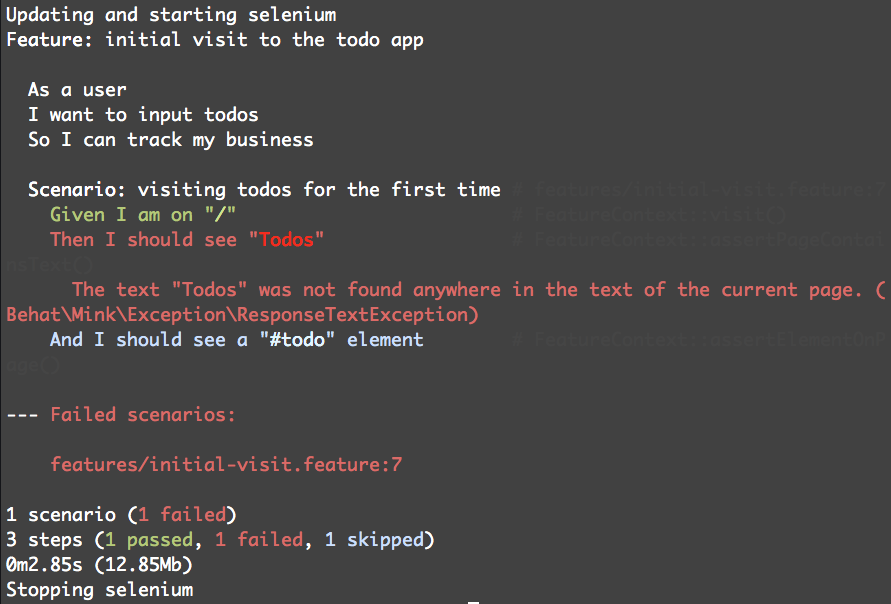
Get to green!
<!-- public/index.php -->
<h1>Todos<h1>
<input type="text" id="todo" />
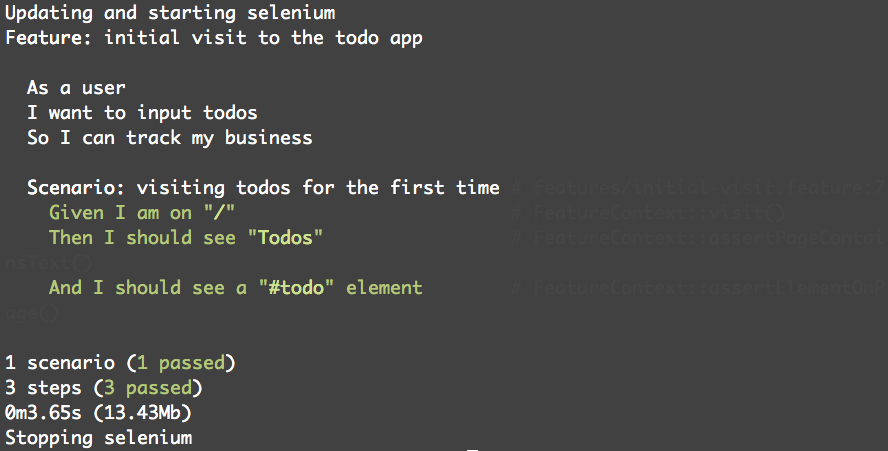
Repeat!
Feature: adding a todo
As a user
I want my todos to be persisted
So I don't have to retype them
Scenario: adding a todo
Given I am on "/"
When I fill in "todo" with "Get groceries"
And I press "add"
And I reload the page
Then I should see "Get groceries"
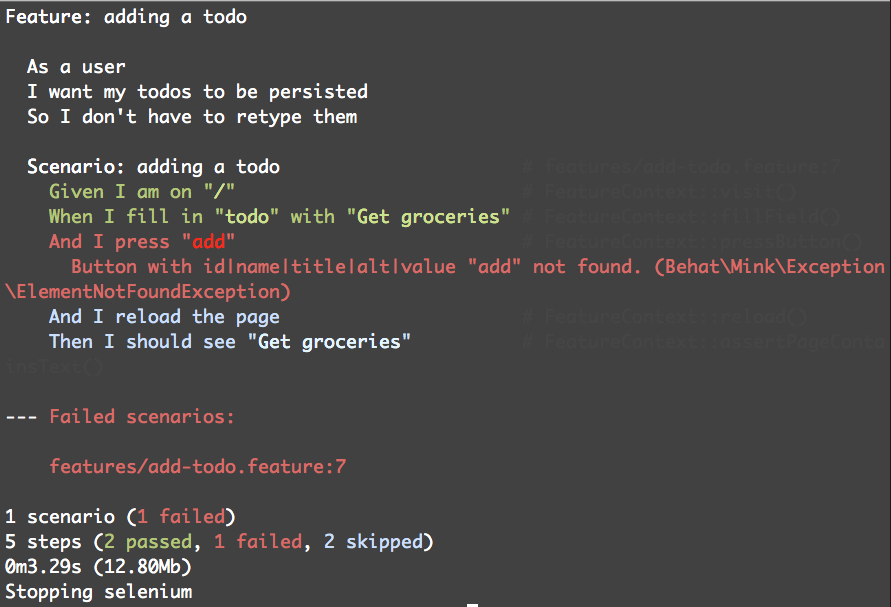
We can pass that step!
<!-- public/index.php -->
<h1>Todos<h1>
<input type="text" id="todo" /> <button id="add">add</button>
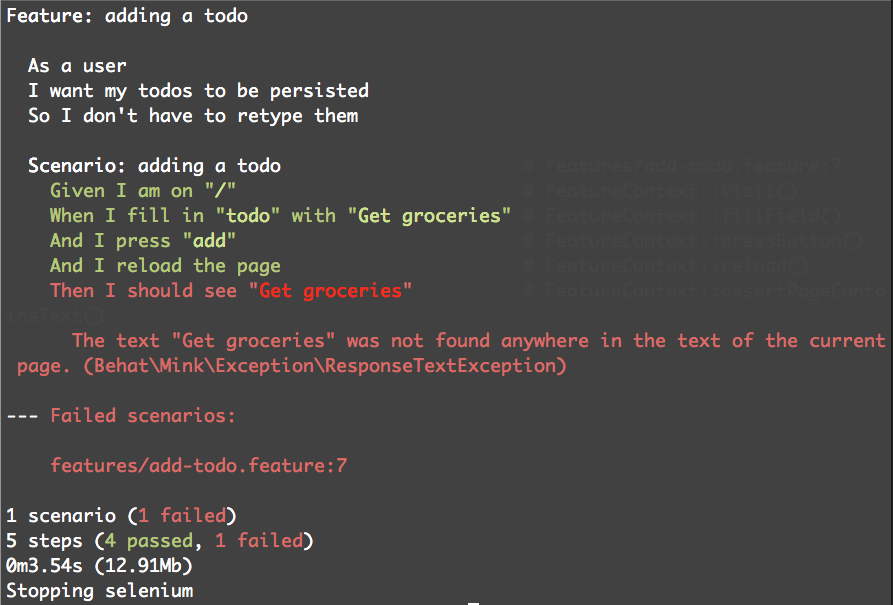
Getting Serious
We've started our acceptance test cadence. However - we need to come to terms with reality: A single index.php probably won't cut it. We need to start writing real code.

The decision has been made to use a framework for the code behind the features. We happen to like Silex.
Drop to Peridot
We need to start writing code to support the features of our todo application. We are at a point where we want to pursue BDD at the unit level.
<?php
use Symfony\Component\HttpFoundation\Request;
describe('TodosController', function () {
beforeEach(function () {
$this->controller = new TodosController();
});
describe('->create()', function () {
it('should insert a todo', function () {
$request = Request::create('/todos', 'POST', [], [], [], [], json_encode([
'label' => 'Get groceries'
]));
$this->controller->create($request);
// what is our behavior?
});
});
});
Peridot And Prophecy
Mocks and spies are a great way to verify behavior. Peridot has a plugin for using the amazing mocking framework: Prophecy
Using Plugins
Plugins are installed like any other package, and are included via the peridot.php file contained in the project root.
Registering the Prophecy plugin
<?php //peridot.php
use Peridot\Plugin\Prophecy\ProphecyPlugin;
// if peridot.php returns a closure it will be called with
// the Peridot event emitter, a key component to extending Peridot
return function($emitter) {
$prophecy = new ProphecyPlugin($emitter);
};
This plugin adds Prophecy functionality to our specs.
Testing Behavior With Mocks
<?php
use Symfony\Component\HttpFoundation\Request;
use Brianium\Todos\Controller\TodosController;
describe('TodosController', function () {
beforeEach(function () {
$this->collection = $this->getProphet()->prophesize('MongoCollection');
$this->controller = new TodosController($this->collection->reveal());
});
describe('->create()', function () {
beforeEach(function () {
$this->data = ['label' => 'Get groceries'];
});
it('should insert a todo', function () {
$request = Request::create('/todos', 'POST', [], [], [], [], json_encode([
'label' => 'Get groceries'
]));
$this->controller->create($request);
$this->collection->insert($this->data)->shouldBeCalled(); //thanks Prophecy!
$this->getProphet()->checkPredictions();
});
});
});
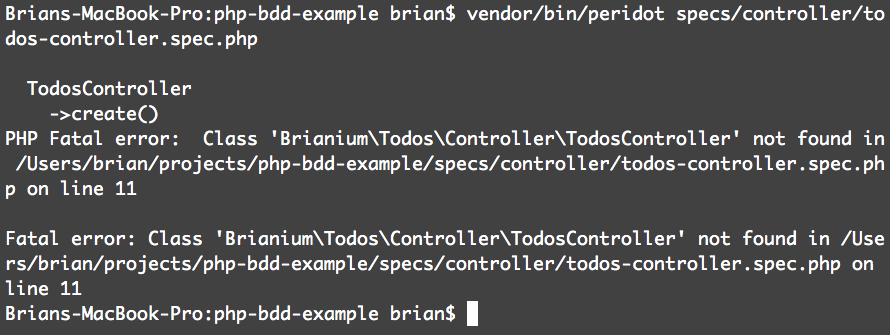
Fix one thing at a time
<?php
namespace Brianium\Todos\Controller;
class TodosController
{
}
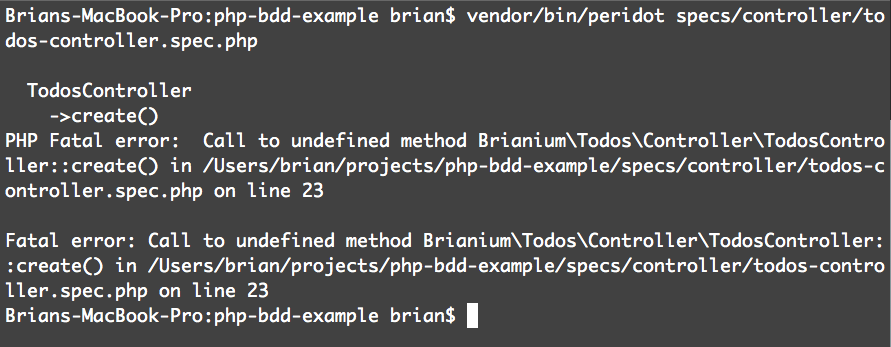
Keeping making fixes
<?php
namespace Brianium\Todos\Controller;
class TodosController
{
public function create()
{
}
}
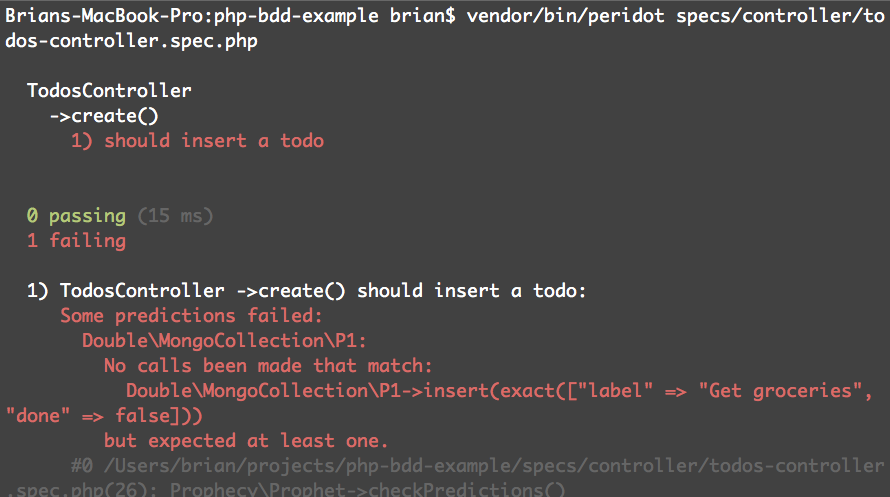
Bring it on home
<?php
namespace Brianium\Todos\Controller;
use MongoCollection;
use Symfony\Component\HttpFoundation\Request;
class TodosController
{
private $todos;
public function __construct(MongoCollection $todos)
{
$this->todos = $todos;
}
public function create(Request $request)
{
$payload = json_decode($request->getContent(), true);
$this->todos->insert($payload);
}
}

To make our API useful, we should return our new resource
<?php
use Symfony\Component\HttpFoundation\Request;
use Brianium\Todos\Controller\TodosController;
describe('TodosController', function () {
beforeEach(function () {
$this->collection = $this->getProphet()->prophesize('MongoCollection');
$this->controller = new TodosController($this->collection->reveal());
});
describe('->create()', function () {
beforeEach(function () {
$this->data = ['label' => 'Get groceries'];
$this->request = Request::create('/todos', 'POST', [], [], [], [], json_encode($this->data));
});
it('should insert a todo', function () {
$this->controller->create($this->request);
$this->collection->insert($this->data)->shouldBeCalled();
$this->getProphet()->checkPredictions();
});
it('should return the new todo', function () {
$response = $this->controller->create($this->request);
$todo = json_decode($response->getContent());
assert($todo->label == 'Get groceries');
});
});
});
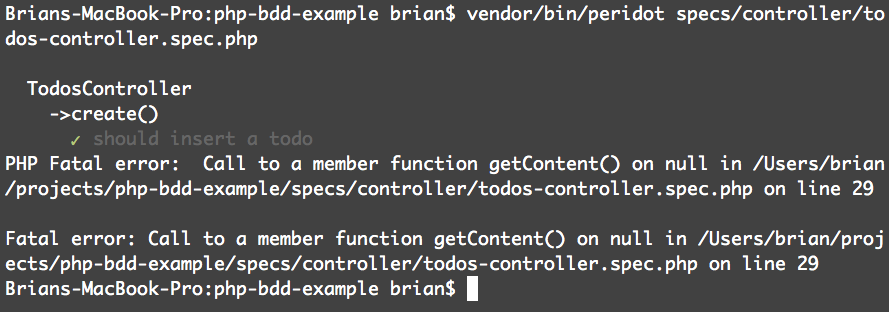
Returning the newly created resource
<?php
namespace Brianium\Todos\Controller;
use MongoCollection;
use Symfony\Component\HttpFoundation\Request;
use Symfony\Component\HttpFoundation\JsonResponse;
class TodosController
{
private $todos;
public function __construct(MongoCollection $todos)
{
$this->todos = $todos;
}
public function create(Request $request)
{
$payload = json_decode($request->getContent(), true);
$this->todos->insert($payload);
return JsonResponse::create($payload);
}
}
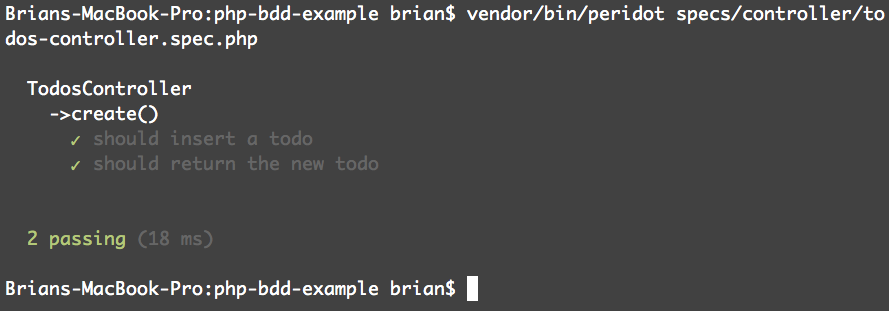
Finishing Our Feature
using twig to render our todos
<html>
<head>
<title>Todo List</title>
</head>
<body>
<h1>Todos</h1>
<input type="text" id="todo" /> <button id="add">add</button>
<ul id="todos">
{% for todo in todos %}
<li>{{ todo.label }}</li>
{% endfor %}
</ul>
<script src="//cdnjs.cloudflare.com/ajax/libs/lodash.js/3.5.0/lodash.min.js"></script>
<script src="//code.jquery.com/jquery-2.1.3.min.js"></script>
<script src="js/todos.js"></script>
</body>
</html>
A controller action for index
<?php
namespace Brianium\Todos\Controller;
use MongoCollection;
use Symfony\Component\HttpFoundation\Request;
use Symfony\Component\HttpFoundation\JsonResponse;
use Twig_Environment;
class TodosController
{
private $todos;
private $twig;
public function __construct(MongoCollection $todos, Twig_Environment $twig)
{
$this->todos = $todos;
$this->twig = $twig;
}
public function index()
{
$content = $this->twig->render('index.twig', ['todos' => $this->todos->find()]);
return Response::create($content);
}
public function create(Request $request)
{
$payload = json_decode($request->getContent(), true);
$this->todos->insert($payload);
return JsonResponse::create($payload);
}
}
A Sprinkle Of JavaScript
(function () {
var todo = $('#todo'),
add = $('#add'),
list = $('#todos');
/**
* Returns an event handler that appends
* text from input to a list element.
*
* @param {jQuery} list
* @param {jQuery} input
* @return {Function}
*/
function append(list, input) {
return function () {
var val = input.val();
list.append('<li>' + val + '</li>');
return val;
};
}
/**
* Persist the todo
*
* @param {String} val the todo label
*/
function create(val) {
$.ajax({
method: 'POST',
url: '/todos',
data: JSON.stringify({label: val}),
contentType: 'application/json',
dataType: 'json'
});
}
add.click(_.compose(create, append(list, todo)));
})();
Our Passing Feature
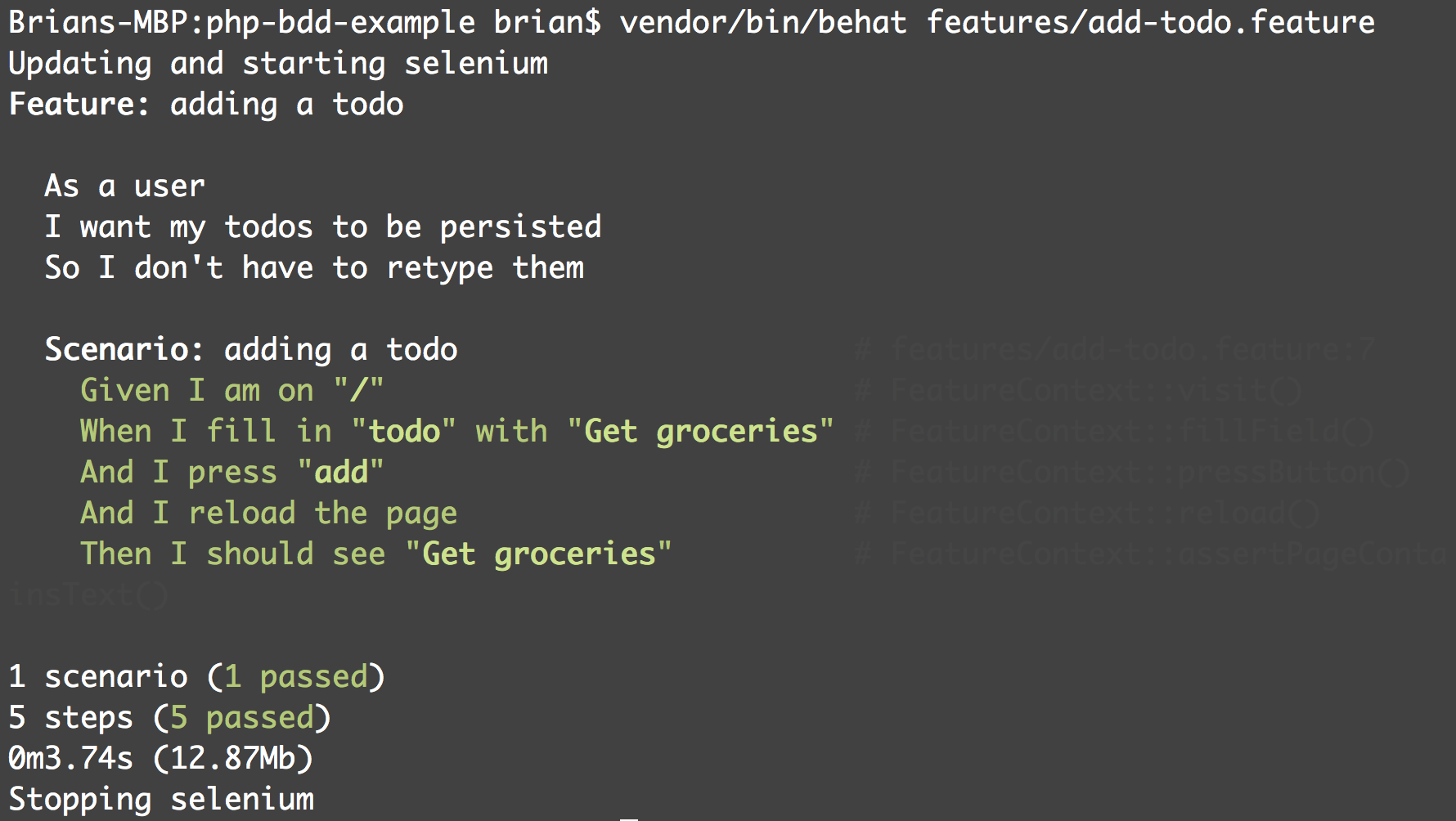
Reference: Silex App File
How Silex works is beyond the scope of this talk, but if you want to refer to the todo app to see how a controller is tied to a route, take a look at the app file.
Iterate! Iterate! Iterate!
Sidebar: Peridot for route tests
A lot of behavior, especially for APIs, ends up outside of the context of a controller - usually in the form of middleware. This is a good thing, especially when it is repeated everywhere.
The HttpKernel Plugin
<?php
use Peridot\Plugin\Prophecy\ProphecyPlugin;
use Peridot\Plugin\HttpKernel\HttpKernelPlugin;
return function($emitter) {
$prophecy = new ProphecyPlugin($emitter);
//set up app tests
$app = include __DIR__ . '/app/app.php';
$app['debug'] = true;
$app['exception_handler']->disable();
$app['todos-collection'] = $app['mongo-client']->test->todos;
HttpKernelPlugin::register($emitter, $app);
};
Testing high level API behavior
<?php
describe('/todos/{id}', function () {
beforeEach(function () {
$app = $this->getHttpKernelApplication();
$app['todos-collection']->remove();
$this->document = ['label' => 'Do a thing!'];
$app['todos-collection']->insert($this->document);
});
describe('POST', function () {
it('should return an error response if the todo already exists', function () {
$this->client->request('POST', '/todos', [], [], [], '{"label":"Do a thing!"}');
$response = $this->client->getResponse();
assert($response->getStatusCode() === 422);
});
});
});